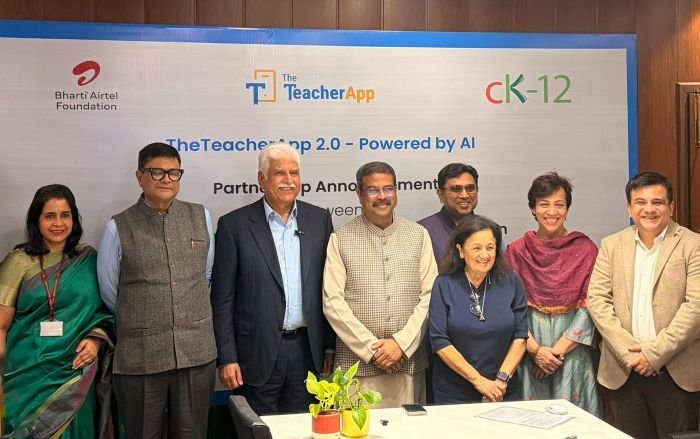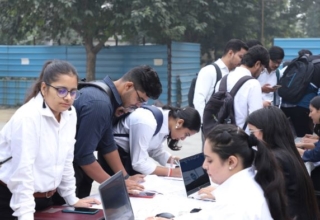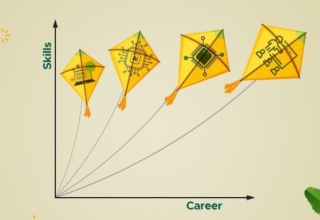
ILO, NSDC, World Bank, and UNESCO on July 4 jointly organized the 8th SKILLS Bridge Masterclass conducted by ILO India office Geneva. In addition to union Skills minister, Jayant Chaudhary, who delivered the inaugural keynote, Dr. Haja Ramatulai Wurie, Minister of Technical and Higher Education, Sierra Leone and Ruben Sargsyan, Deputy Minister of Labor and Social Affairs, Armenia participated in panel discussion highlighting their own digital skilling successes.
In an ever-changing world, adaptation of lifelong learning for individuals and societies for relevant knowledge, skills, and perspectives is the new mantra embraced by the International Labor Organization (ILO). Under this strategy, it is running several initiatives including workshops to equip governments and other stakeholders to achieve this transformation.
In the 8th SKILLS Bridge Masterclass conducted by ILO India office virtually on July 4, India’s Skill India Digital Hub (SIDH) was featured as an emerging model for the world. It was jointly organized by the National Skill Development Corporation (NSDC), International Labour Organization (ILO), World Bank and UNESCO. The webinar attracted over 120 delegates and 3000 participants with the discussion centered on leveraging digital infrastructure, work-based learning models, and industry-academia partnerships to bolster the skills and lifelong learning ecosystem.
SIDH is part of digital public infrastructure (DPI) flagship initiative of the Government of India for leveraging digital technologies for skill development through its inclusive, technology-driven approach. The discussion uncovered the numerous possibilities and challenges that accompany digital transformation, with a special focus on Skill India Digital Hub (SIDH), a leading example of Digital Public Infrastructure (DPI) revolutionizing learning and skill development. The webinar featured illuminating case studies from India, showcasing innovative approaches to leveraging digital technologies for enhancing skilling, reskilling, and upskilling initiatives. These insights will help in adapting to the dynamic job market and addressing global challenges effectively.
From discovery to assessment, certification, employment and lifelong learning, customization and personalization made possible by AI is at the heart of SIDH’s effort to become another API that will give brand India more recognition and become an aggregator of end to end companion of lifelong learning by way of virtual mentors, virtual labs and other resources without having to bother for multiple channels for the same.
Jayant Chaudhary, Union minister of Skill Development and Entrepreneurship (MSDE), emphasized the pivotal role of digital infrastructure and collaborative learning models during his address. Saying that DPI empowers learners everywhere, the minister SIDH is helping India bridge the gap between aspiration and opportunities and is fostering inclusivity. He added that Digital learning is the cornerstone of development it can reach everywhere and become accessible to people of all demographics to engage in lifelong learning and as a workforce remain relevant and in the competitive global market and embracing AI in this journey is imperative and a necessity. “Let’s build a global ecosystem where learning never stops and all of us grow and succeed together.”
Dr. Haja Ramatulai Wurie, Minister of Technical and Higher Education, Government of Sierra Leone illustrated how her country is strategizing digital transformation in the system to cope with the increased need for more capacity in the higher education after school enrollments surged in recent years.
She informed that Sierra Loane has formed a new ministry for Communication Technology and Innovations to optimize resources between various agencies in a collaborative manner. She said reskilling and upskilling, digital curriculum development, harmonization and relevance, AI, prompt engineering, soft skills, digital literacy, global citizenships, etc tools are being integrated at system and program levels. She also talked about how data through LMS and other platforms is being used for insights and policy directions and training. “By removing financial barriers in school education, there has been an increase in the enrollment, but how we don’t have enough infra for higher education to absorb school leavers. Last year all our HEIs both public and private could at best admit less than 30% of qualifiers in the entrance exam, so we are pursuing online and distance education. This needs a continuum of digital literacy right from school for online education to succeed. We’re constantly learning from the changes for needs of our country,” she said.
Ruben Sargsyan, Deputy Minister of Labour and Social Affairs, Government of Armenia in his remarks said, by collaborating with ministries and the private sector, we aim to revitalize industries and provide youth with opportunities to upskill in entrepreneurship and new-age skills. Therefore, digital platforms are crucial for enhancing training, job placements, and an outcome-driven finance system, paving the way for an inclusive and sustainable future.
The webinar was attended by Atul Kumar Tiwari, Secretary, Ministry of Skill Development and Entrepreneurship; Ravi Peiris – OIC, ILO Decent Work Team for South Asia and Country Office for India; Dr. Borhene Chakron- Director of Policies and Lifelong Learning, UNESCO; Debjani Ghosh, President, NASSCOM, India; Shabnam Sinha, Lead Education Specialist, World Bank; Dr. Ashwani Aggarwal, Workgroup Leader (Skills and Lifelong Learning Policy, Systems and Digitalization), ILO Geneva; Ved Mani Tiwari, CEO, NSDC and MD, NSDC International and Shreshtha Gupta, CTO, NSDC & NSDC International.







